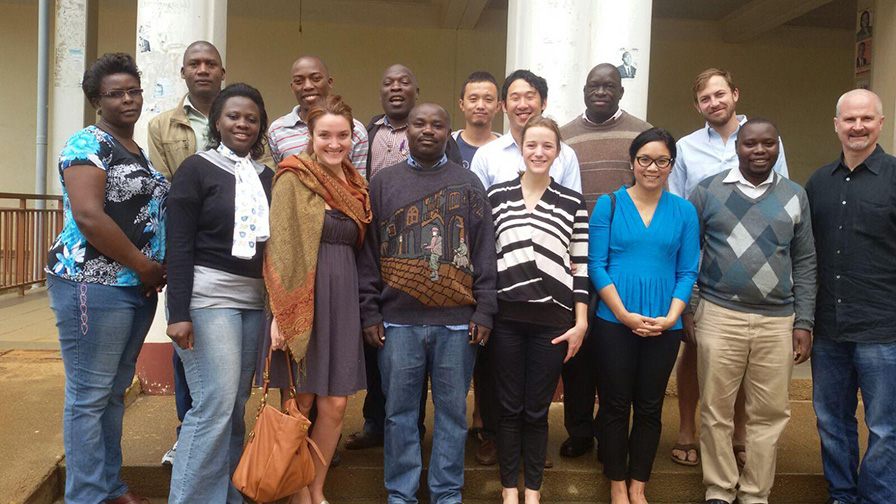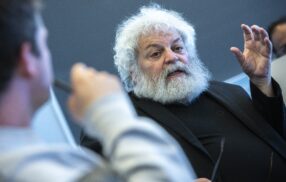
In Uganda, Darden Finds – and Fans – Familiar Spark of Entrepreneurship
By Dave Hendrick
As part of a new partnership stretching across the Atlantic, students and faculty from the University of Virginia Darden School of Business are partnering with Ugandan companies and teaming up with a young business school in Mbarara, Uganda.
During Darden’s winter break, Senior Assistant Dean for Degree Programs Michael Koenig traveled with seven Darden students to Uganda to complete consulting engagements with local businesses and meet students and faculty at the Institute of Management Sciences at Mbarara University of Science and Technology. The onsite visit represented the culmination of students’ semester-long research partnerships with Ugandan companies, undertaken as part of Darden’s Global Consulting Projects elective program. That program pairs Darden students with organizations around the world to solve a pressing challenge the organization is facing.
Koenig connected with IMS through a colleague in UVA’s School of Medicine, Dr. Christopher Moore, who has conducted research in Mbarara for several years.
“IMS is interested in becoming a regional and countrywide business school that could eventually expand across East Africa,” Koenig said. “This partnership is an opportunity for them to learn from Darden and for Darden to connect to Africa and find opportunities for faculty and students to learn more about business there.”
One student team worked with IMS to develop a strategic plan for the school’s future, while another worked with Nile Breweries, to create a zero-waste production plan. Additionally, Aldea Meary-Miller (Class of 2016), who is also pursuing a Master of Public Health degree through Darden’s dual-degree program, studied strategies for improving the supply and distribution of pharmaceuticals in hospitals in Mbarara.
The students working with IMS developed recommendations to help the school compete with other public and private higher education institutions in the area. These included strategies for establishing a strong, regionally based alumni network; creating blended online learning models; enhancing faculty training; and improving the school’s website and social media platforms.
“MBA programs are relatively new in Uganda, which made benchmarking the market and competitors challenging,” Christine Thach (Class of 2016) wrote in an email. “To overcome this challenge, we conducted on-site and virtual interviews with key stakeholders to supplement gaps in our market research, and developed a comprehensive understanding of the business environment.”
Thach and her fellow students were struck by the entrepreneurial spirit of the Ugandan students, faculty and businesses, even in the face of various infrastructure and resource challenges.
Uganda is the youngest country in the world, with roughly 70 percent of the country’s population under the age of 24. However, youth unemployment remains high at more than 80 percent.
“While there is a lot of uncertainty about what the future holds, Ugandans are driven and optimistic about the opportunities ahead,” Thach wrote. “Every person I met had a strong sense of social responsibility and a passion for entrepreneurship, driven by a desire to help spur economic development and job creation.”
Matthew Krieg (Class of 2016) observed the same drive at Nile Breweries, where his team worked with brewers to reduce waste and improve sustainability.
“The entrepreneurial drive of people who are working with few resources was incredible to see,” Krieg said. “It is very clear that the business and entrepreneurial spirit is completely undaunted by the challenges that present themselves.”
Krieg and his team worked with a waste manager at the brewery to outline strategies for sustainably disposing of organic waste from the brewing process. Krieg’s team had researched how other breweries transformed the waste into agricultural fertilizer or animal feed, and the Ugandan waste manager had begun building relationships with local farmers with that goal in mind.
The lack of infrastructure for disposing of the waste in a large-scale, systematic way forced the team to think about the problem much more locally, Krieg said.
“It is interesting how a lack of infrastructure can limit you, but also target what you are trying to do,” he said.
Meary-Miller, who was working with hospitals to improve access to pharmaceutical supplies, also learned the importance of understanding the local and cultural context surrounding any business problem.
Prior to traveling to Uganda, Meary-Miller worked with pharmacists at the UVA Medical Center to understand how medications are ordered, delivered and distributed. Once in Uganda, she shared that information with officials at IMS and a local hospital and provided analysis to determine how those strategies could be adopted or modified to solve supply problems in Uganda.
“My experience highlighted how important it is to understand the context of the problem and the barriers at a local level,” Meary-Miller said. “I think that is something that is often overlooked, and that it is often important to put just as much thought into the process as the solution.”
In addition to completing the Global Consulting Projects, Koenig asked his students to consider how Darden might continue to partner with IMS, grow its presence in Uganda and help future students gain experience working in developing countries.
“I think that our students, on this trip, learned that business at the end of the day is a combination of being empathetic, being willing to learn and grow, being willing to do that quickly and building long-term relationships,” Koenig said. “They realize how important it is to go somewhere, get those experiences firsthand and talk to those who live and breathe that reality every day.
“That is why I am so passionate about extending Darden’s opportunities across the developing world, where the challenges are complex but the opportunities are massive.”
This story originally appeared in UVA Today.
The University of Virginia Darden School of Business prepares responsible global leaders through unparalleled transformational learning experiences. Darden’s graduate degree programs (MBA, MSBA and Ph.D.) and Executive Education & Lifelong Learning programs offered by the Darden School Foundation set the stage for a lifetime of career advancement and impact. Darden’s top-ranked faculty, renowned for teaching excellence, inspires and shapes modern business leadership worldwide through research, thought leadership and business publishing. Darden has Grounds in Charlottesville, Virginia, and the Washington, D.C., area and a global community that includes 18,000 alumni in 90 countries. Darden was established in 1955 at the University of Virginia, a top public university founded by Thomas Jefferson in 1819 in Charlottesville, Virginia.
Press Contact
Molly Mitchell
Associate Director of Content Marketing and Social Media
Darden School of Business
University of Virginia
MitchellM@darden.virginia.edu




